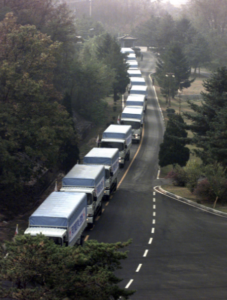Typhoon Floods North Korea
North Korea has admitted a need for international assistance as it struggles with Typhoon Lionrock, one of the most devastating natural disasters in its history. The United Nations’ Office for the Coordination of Humanitarian Affairs published a snapshot of the crisis, providing figures that reviewed the flood. The heavy rains from the typhoon have displaced tens of thousands of residents in Northeastern North Korea, killing 133 and damaging 35,500 houses and 8,700 buildings. In a recent interview with CNN, Chris Staines, an official from the International Federation of Red Cross and Red Crescent Societies, said that “there was barely a building left unscathed… the floods came through with such force — they destroyed everything in their path.” The North Korean government, with expected assistance from the international humanitarian community, promises to reconstruct 20,000 houses by early October in preparation for winter.
A joint assessment by UN agencies, the Red Cross, and other international NGOs has concluded that villages affected by the flood most immediately need shelter, food, health, water, and sanitation; the agencies are distributing relief material in the region. Musan, one of the poorest cities in North Korea, is the most heavily affected with 76,000 people displaced. It is followed by Yonsa, another impoverished city, with 17,000 displaced.
North Korea is not new to natural disasters. In the mid-to-late 1990s, the country struggled with a series of floods and droughts that led to a severe famine. However, this incident was the last time North Korea called for international assistance. While its food situation has improved, many countries and organizations have accused the regime of wasting the resources designated for humanitarian causes on the luxurious lifestyles of the ruling class and the controversial nuclear weapons program.
The issue of aid has given rise to a political discussion within South Korea. The opposition party calls for humanitarian support, while the current government, citing tensions from the recent nuclear tests, stays adamantly opposed. Rumors of an upcoming sixth test have significantly diluted North Korea’s call for international assistance. It will be an interesting week as the world responds to a humanitarian crisis charged with political tension.

